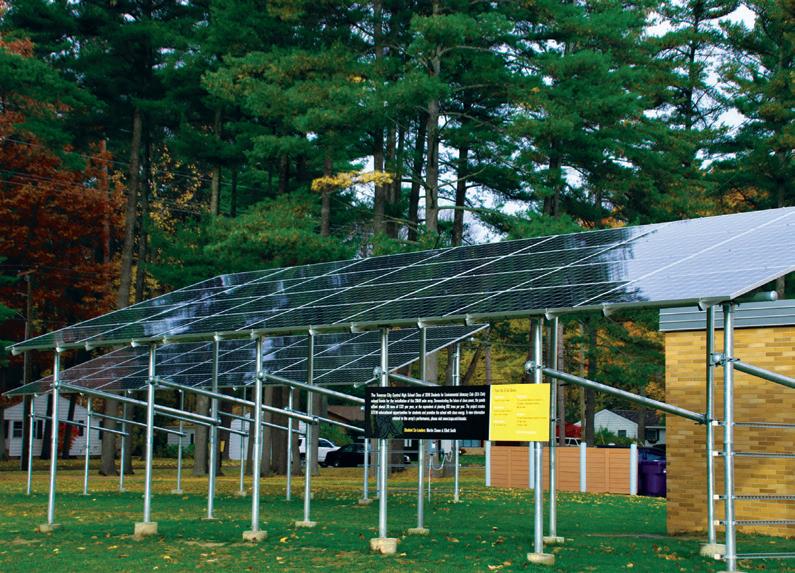
3 minute read
Goin’ for Green maintaining a green school status
Goin’ For Green
Does CHS have what it takes to maintain the highest tier of ‘green school’ status ?
Advertisement
by: ADDISON SWANSON staff writer
TRAVERSE CITY— It is perhaps a moral obligation for any community to not only acknowledge the festering impediment of a declining environment that faces them, but to also set forth a genuine effort to protect the environment from the pollutants and other anthropogenic activities that plague it. Central’s SEA club’s approach to this pressing difficulty deals closely with using natural resources sustainably and enacting solutions and projects that promote a healthy environment. “SEA stands for Students for Environmental Advocacy,” says Hope Hanna ‘21, a leader of Central’s SEA club, which has had a considerably productive year thus far in terms of ensuring that CHS implements and upholds environmentally-friendly practices. “This year we carried out a candy wrapper drive for Halloween and we regularly institute battery, clothing and makeup drives. We’re also still trying to get compost and recycling in the cafeteria,” she adds. Needless to say, SEA club’s members and advocates are generally working towards a common goal—a healthy environment. SEA club is composed of several differentiating committees, Green Group being one. Green Group is a specialized branch of SEA club that has a more focused strategy to encourage a thriving environment and to maintain the school’s ‘evergreen’ status. “Evergreen status is the highest tier for a green school. As opposed to the entirety of SEA club, Green Group is really more focused on supporting CHS’s evergreen status. We determine what else we need to do in order to be eligible for and sustain that label,” Hanna explains, “There are four categories that we have to consider on the evergreen school application form: energy, recycling, environmental protection, and miscellaneous,” Hanna details. A green school must attain a minimum of five points in each category for it to count towards the
achievement of evergreen status. Green Group usually sends in about 30 points just to ensure that CHS’s evergreen status is renewed in the event of a point falling through. The submission itself must be sent for evaluation to the Michigan Green School Foundation, a non-profit organization dedicated to assisting Michigan schools endorse ecologically-friendly practices, by March 1st. According to Kelly Smith, SEA club’s adult advisor and CHS science teacher, “evergreen status has to do with the quality and quantity of the projects that SEA club and Green Group are doing and the ratings that those projects receive. The effort that the school is making towards becoming a greener school is ultimately what gets rated.” Green Group’s center of interest regarding green school projects includes, for example, the acquisition of funds for the installation (and the installation itself) of the solar panels. Such extensive efforts made by SEA club and Green Group have lit the lamp of inspiration and have brought about a call to action that the entirety of the school’s administration and students together have heeded. CHS utilizes LED lighting, the cafeteria imports foods from local farms, and recycling options have been made available with the provision of recycling bins in almost every classroom. In earlier years, CHS’s student senate even oversaw an adopt-the-road event that involved cleaning up highways. “It’s important for average people, regular students and organizations like SEA club to be helping the environment because the reality is, unfortunately, that we only have one environment and there is a point at which the damage that we’ve inflicted on it will become irreversible,” Smith asserts. The steadily declining environment is casually dismissed and ignored on a daily basis but is nonetheless an extremely relevant problem for this generation. Our actions now will shape the future of upcoming generations and the world that they will live in. Emily Howard, CHS math teacher, echoes this sentiment, “At some point, we as a society have to realize that maintaining and preserving our environment is not a cost—rather it is an investment that we have to start depositing in now. Part of that investment strategy does require an education and action plan—plant the seed, nurture it, provide what it needs, and it will grow and prosper.” The SEA club is one such seed. //









